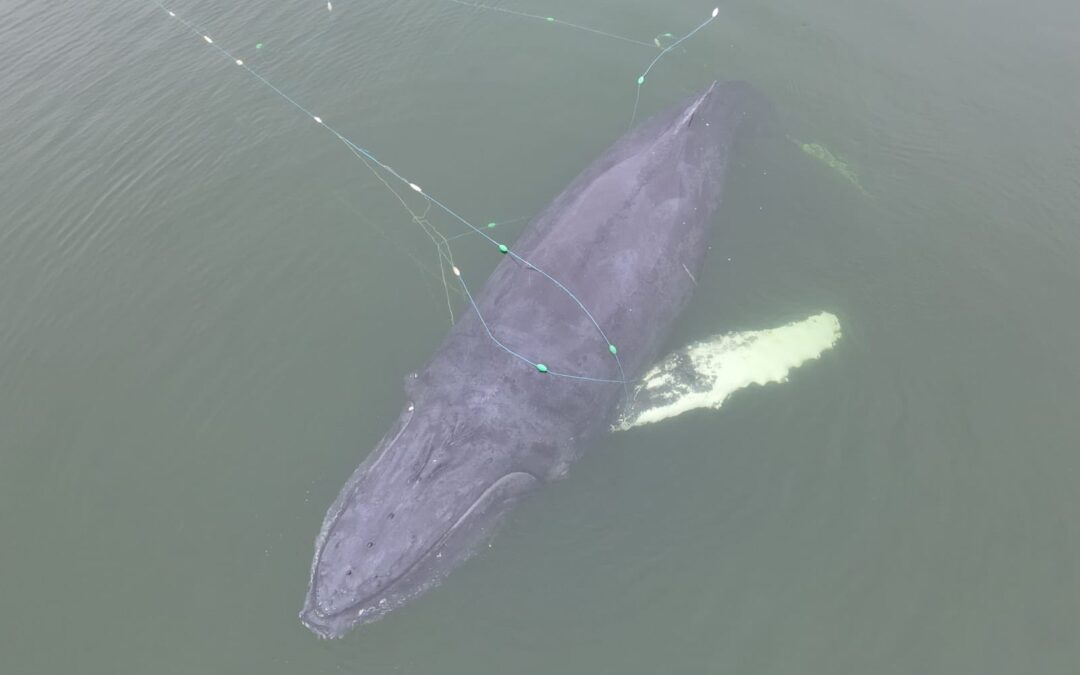Keep our news free from ads and paywalls by making a donation to support our work!

Notes from Poland is run by a small editorial team and is published by an independent, non-profit foundation that is funded through donations from our readers. We cannot do what we do without your support.
A humpback whale that got tangled in fishing nets in the Baltic Sea just off the coast of Poland was freed after an unprecedented rescue operation.
The animal, which is reported to be seven or eight metres long, was spotted near the coastal resort town of Międzyzdroje on Wednesday morning. It was close enough to the shore to be visible from the beach.
No dobra łapcie hit. Był wilk 🐺 w Łebie, pies na Bugu a teraz Humbak Długopłetwiec oceaniczny. W okolicach Dziwnowa na terenie Wolińskiego Parku Narodowego BSR Dziwnów pomaga w rozplątaniu zwierzaka. @PolsatNewsPL @tvn24 @tvp3szczecin @Olejarczyk_Onet @wirtualnapolska… pic.twitter.com/0xhIOE5uia
— Sebastian Kluska (@KluskaSebastian) February 26, 2025
Humpback whales are extremely rare in the Baltic Sea and the last one that was seen in Polish waters was in 2023, reports the Gazeta Wyborcza daily.
“The Baltic Sea is too small for whales, too shallow and with too little food,” Beata Więcaszek, a biologist at the West Pomeranian University of Technology, told website Portal Morski.
She added that they sometimes end up there when noises caused by ships or underwater devices disrupt their sense of orientation and cause them to lose their way. Robert Czerniawski, a biologist at the University of Szczecin, notes that climate change is also disrupting whales’ habits.
A team of rescuers, including members of the Maritime Search and Rescue Service (MSPiR), Water Volunteer Rescue Service (WOPR) and WWF, as well as staff at the Wolin National Park, set to work trying to free the animal, supported by a drone overhead.
“At first, the humpback whale was quite stressed. It was bucking, flapping its fins,” Piotr Goliona from WOPR told the Polish Press Agency (PAP). “Later, it probably got used to it, maybe it knew that we just wanted to help it, because…it just let us untie it, it didn’t buck.”
The head of MSPiR, Sebastian Kluska, then shared a film on social media early in the afternoon showing the moment they managed to free the animal.
However, PAP notes that it is impossible for whales to survive for long in the Baltic Sea because of a lack of food, and that if the animal does not manage to return to the Atlantic it is likely to die.
🚨Kto ze mną na profilu ten zobaczy filmik bomba, kto nie obserwuje ten trąba Moment uwolnienia #humbak
Film Grzegorz Smoter BSR Dziwnów 🫡‼️‼️‼️🚨 pic.twitter.com/zGDjqagL38— Sebastian Kluska (@KluskaSebastian) February 26, 2025

Notes from Poland is run by a small editorial team and published by an independent, non-profit foundation that is funded through donations from our readers. We cannot do what we do without your support.
Main image credit: Sebastian Kluska/X

Daniel Tilles is editor-in-chief of Notes from Poland. He has written on Polish affairs for a wide range of publications, including Foreign Policy, POLITICO Europe, EUobserver and Dziennik Gazeta Prawna.



















